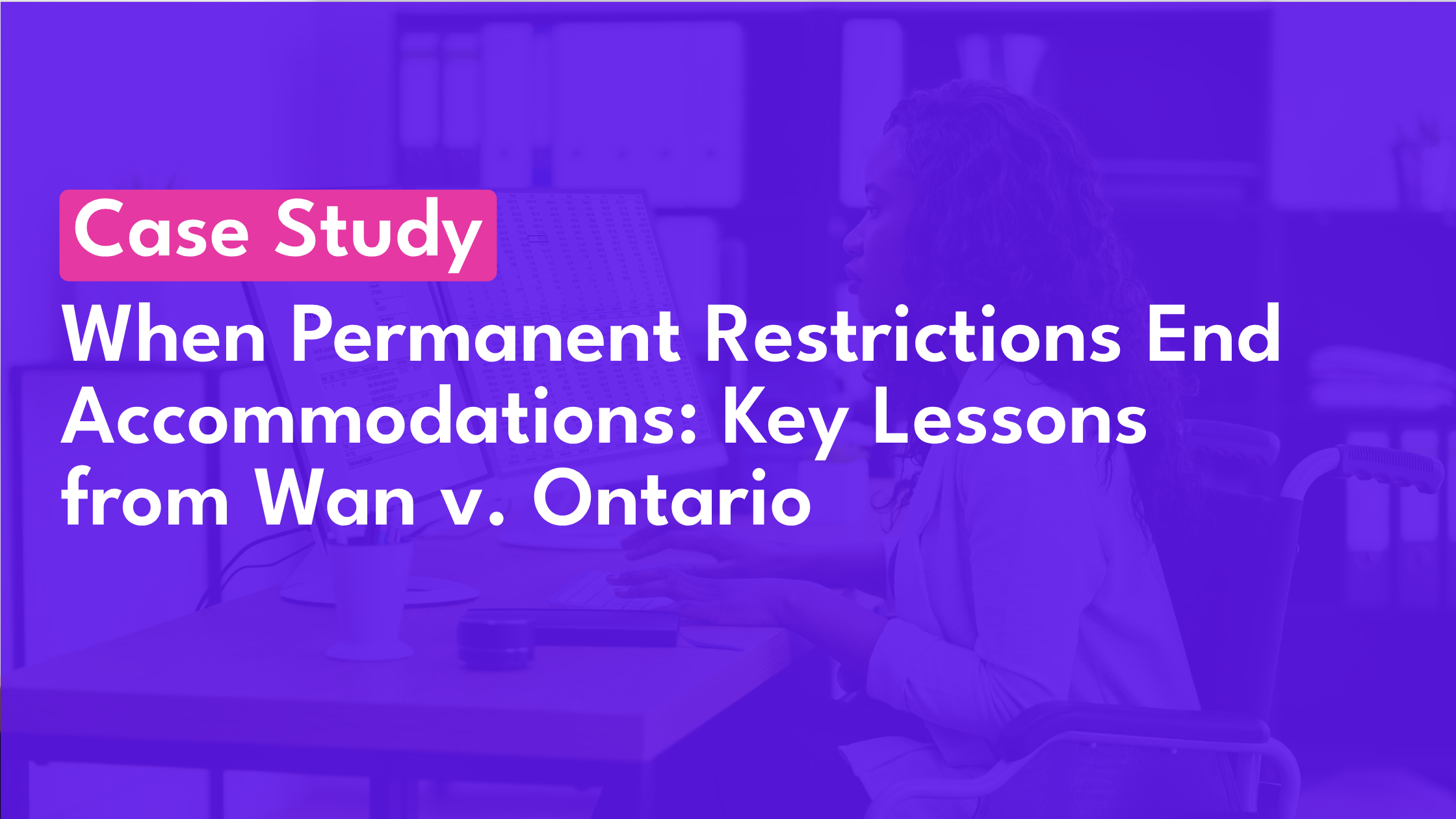Introduction
This case study examines the Ontario Public Service Grievance Board’s decision in Wan v. Ontario (Ministry of the Environment, Conservation and Parks) (P-2023-02995, June 2, 2025), where an adjudicator dismissed a public sector worker’s claim that the Ministry failed to accommodate his disability. The case highlights the legal boundaries of the duty to accommodate under the Ontario Human Rights Code and the concept of undue hardship for employers.
Background
The complainant, Wan, was a manager in the Air Approvals section of the Ontario Ministry of the Environment, Conservation and Parks. After an extended medical leave, Wan returned to work in August 2021 with medical restrictions limiting him to a two-day workweek. His managerial duties were partially reassigned, and he received Short Term Sickness Plan (STSP) payments for non-working days. This arrangement continued for approximately 18 months until March 2023, when Wan’s medical restrictions were declared permanent, requiring three days off per week for recovery.
In May 2023, the Ministry ended the modified work arrangement, citing Wan’s inability to perform core managerial duties. Wan was placed in the Health Reassignment Program, which required an independent medical examination. His STSP credits expired in October 2023, and his application for long-term income protection was denied. Wan announced his retirement in January 2024 and filed a grievance in February 2024, alleging a failure to accommodate under the Ontario Public Service Disability Accommodation Policy (DAP).
Legal Issues
The primary issue was whether the Ministry breached its duty to accommodate Wan’s disability, leading to his removal from his position and alleged forced retirement. The case also addressed whether the Ministry’s actions constituted discrimination under the Ontario Human Rights Code.
Decision and Reasoning
The adjudicator, J. Sengupta, Vice-Chair of the Ontario Public Service Grievance Board, dismissed Wan’s complaint. Key findings included:
- Duty to Accommodate: Wan’s medical condition qualified as a disability, triggering the duty to accommodate, which includes procedural (assessing needs) and substantive (providing reasonable accommodation) elements.
- Temporary Accommodation (2021–2023): The Ministry’s modified work arrangement from August 2021 to May 2023 was appropriate, aligning with Wan’s medical restrictions and acknowledged by him as suitable.
- Permanent Restrictions: When Wan’s restrictions became permanent, the Ministry determined that he could not perform essential managerial duties. The adjudicator held that the duty to accommodate does not require creating a new position or permanently reassigning core duties, as this would constitute undue hardship.
- Health Reassignment Program: The Ministry’s placement of Wan in the reassignment program was a continuation of accommodation efforts, but Wan’s retirement in January 2024 halted this process.
- No Forced Retirement: The adjudicator found no evidence of coercion by the Ministry, attributing Wan’s retirement to personal financial and disability-related stress.
Analysis
The decision underscores that the duty to accommodate requires reasonable, not preferred, accommodation. Employers are not obligated to fundamentally alter a role or create a new position to accommodate permanent restrictions. The case also highlights the importance of updated medical information, as the Ministry relied on Wan’s March 2023 documentation to make its decision. Employment lawyer Madeleine Loewenberg noted that the ruling is significant for employers, demonstrating that undue hardship can be established in specific circumstances (Canadian HR Newswire, n.d.).
Implications
This case provides guidance for employers navigating accommodation requests, specifically these following elements:
- Regular Medical Updates: Employers should request and rely on current medical documentation to assess accommodation needs.
- Undue Hardship Threshold: The decision clarifies that maintaining a temporary accommodation indefinitely may constitute undue hardship if it prevents the employee from performing core duties.
- Employee Responsibilities: Employees must engage in the accommodation process and may need to pursue grievances rather than resigning to claim rights retroactively.
Conclusion
Wan v. Ontario illustrates the balance between an employer’s duty to accommodate and the limits of that obligation when restrictions become permanent. The adjudicator’s dismissal of the complaint reinforces that employers can end accommodations that fundamentally alter a role without breaching anti-discrimination laws, provided they follow procedural and substantive accommodation processes.

